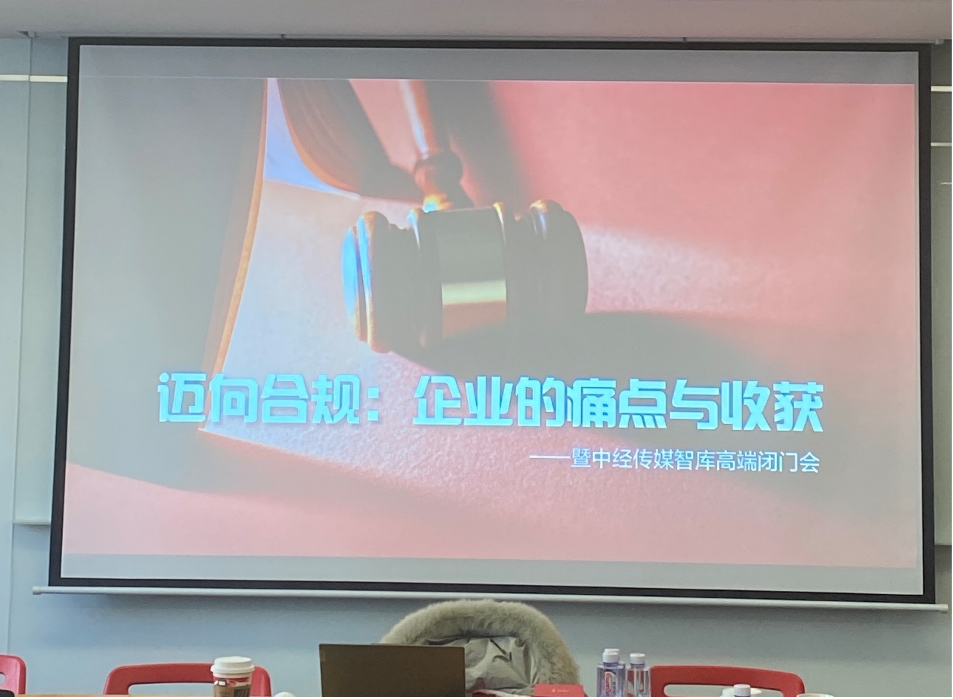Zhang Qian, lawyer from Hwuason, was invited to attend the meeting of "Road to Compliance: Pain Points and Gains of Enterprises" held by CBJ Think Tank
From 14:00 to 19:00 on January 12, 2024, the high-end closed-door meeting " Road to Compliance: Pain Points and Gains of Enterprises " held by CBJ Think Tank, in the building of China Business Journal. The closed-door meeting invited leaders and heads of compliance departments from a number of public institutions and well-known enterprises to participate. Zhang Qian, a lawyer from Hwuason Law Firm, was invited to attend the closed-door meeting.

The closed-door meeting mainly focused on three topics, and the participating experts, combined with their own service fields and professions, expressed their views on the pain points of enterprise compliance construction, the value of compliance construction, and the training of compliance talents.
The first part of the conference mainly discussed the pain points and difficulties encountered by enterprises in compliance construction, analyzed how these pain points hindered the development of enterprises or industries, and discussed the causes and solutions of these pain points. Lawyer Zhang Qian discussed the tax compliance risks faced by enterprises from three aspects.
First of all, corporate compliance is based on familiarity, understanding and correct application of laws and regulations. However, in the field of tax law, there are many relevant tax regulations, and they are modified and changed with the adjustment of national fiscal and tax policies. Enterprises have some difficulties in mastering and applying tax regulations. In addition, due to the relatively abstract provisions of some tax laws and regulations, the tax bureau and enterprises may have different understandings of the same provisions, resulting in administrative disputes over enterprise tax treatment, which are pain points for enterprise tax compliance.
Secondly, lawyer Zhang Qian pointed out that most business leaders want to pay less tax. While tax laws allow taxpayers to reduce their tax burden by legally structuring their trading patterns, companies should implement these tax arrangements within the framework of the law. In practice, in order to attract investment, some places have formulated financial awards and return policies, forming the so-called "tax depression". The National Audit Work Conference on January 11 highlighted efforts to clean up local policy violations. Obviously, these policies are no longer sustainable, and may even bring tax risks to enterprises, enterprises should return to legal fiscal and tax policies.
Thirdly, enterprises can prevent some tax risks through good internal compliance, but there are also some external transmission risks that enterprises can not control unilaterally. For example, if the supplier of an enterprise escapes and loses contact, issuing false invoices, etc., the risks related to invoices will be implicated in the enterprise. Enterprises can reduce the risk of upstream enterprise transmission by screening the qualifications, economic strength and supply capacity of suppliers.

The second part of the conference discussed how the compliance work contributes to the profits and value of the enterprise and how to examine the effectiveness of the compliance work. Lawyer Zhang Qian put forward that the value of tax compliance to enterprises can be observed from three aspects: The first aspect is intuitive, that is, through tax compliance, enterprises understand the relevant tax regulations and enjoy some tax incentives, such as qualified enterprises to declare high-tech enterprises, which can intuitively save costs for enterprises; The second aspect is more indirect, mainly manifested as preventing risky business and mode through tax compliance, avoiding potential losses for enterprises; The third aspect can be seen from the response links after the outbreak of tax risks. If an enterprise is faced with tax administrative inspection or tax crime cases, whether the tax compliance construction carried out by the enterprise can play a role, such as whether the business model established by the enterprise, the business and tax data retained by the enterprise can help the enterprise obtain the approval of the administrative authority for the authenticity and legitimacy of the business.
The third part of the meeting discussed the training of compliance personnel and the construction of compliance organizations. Lawyer Zhang Qian pointed out that when recruiting and introducing tax compliance talents, it is necessary to put forward certain requirements for personal ethical standards, and tax compliance personnel should start from themselves. Secondly, tax compliance personnel should be high quality, compound, to master business, law, tax, finance, to understand the company's business model and details. She pointed out that companies can consider cultivating compliance talent from within as they grow.
Practice has proved that with the continuous advancement of the construction process of the rule of law in China, the sustainable development of enterprises is far from enough to rely only on technology and market. Enterprises should pay attention to the construction of corporate compliance, especially tax compliance, prevent legal risks, and guarantee the normal operation of enterprises, so as to enhance the core competitiveness of enterprises and help the healthy and sustainable development of enterprises.





